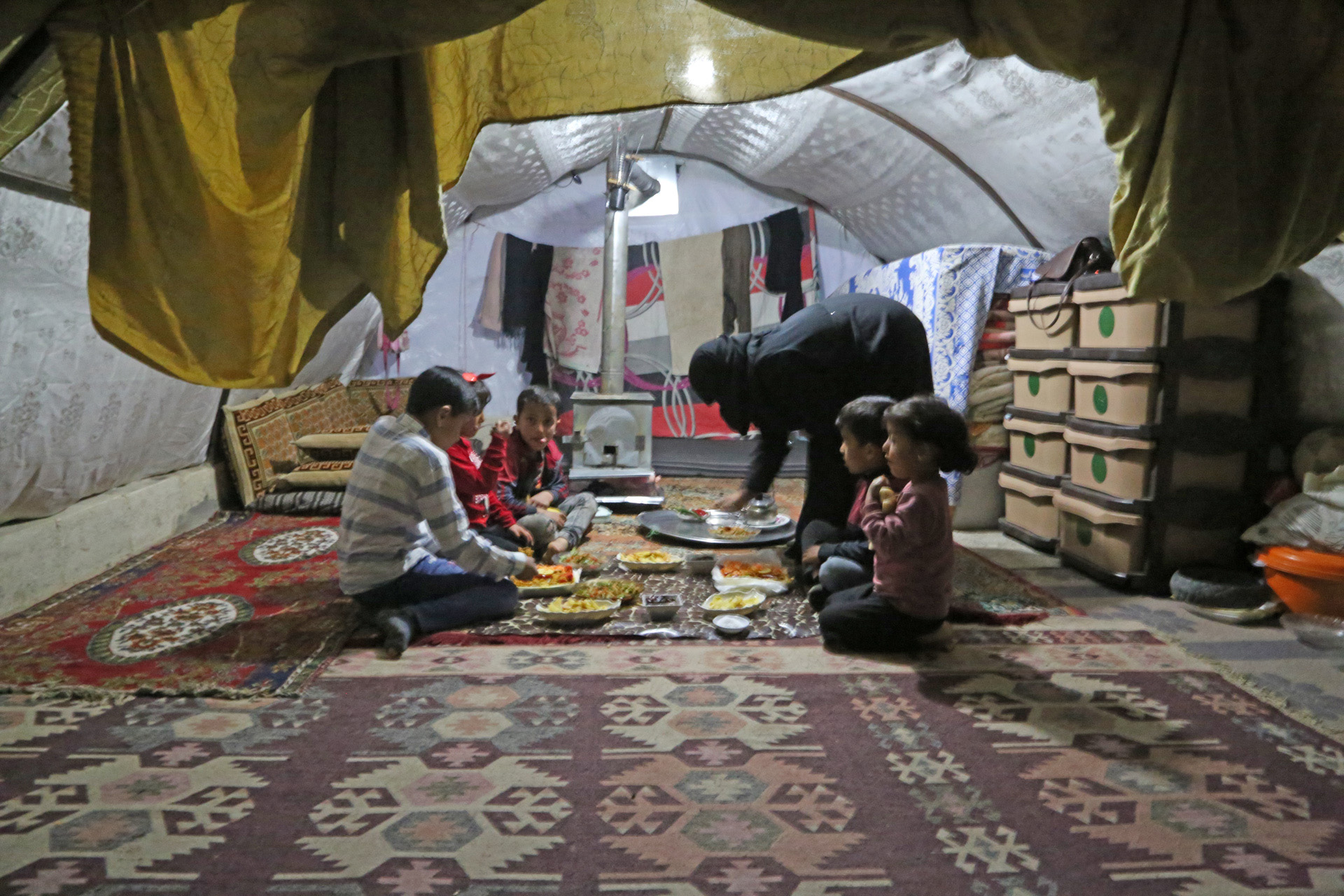Northern Syria - As the call to prayer approaches, Syrian displaced woman Abeer al-Ahmad is busy preparing an Ramadan breakfast from the contents of a food basket provided by a humanitarian organization, inside camps sheltering those affected by the earthquake that struck the north of the country last month.
Through a small stove parked in the corner of the old cloth tent, the displaced widow cooks a little rice and vegetables, while her young children circle the middle of the tent waiting for the muezzin to start breaking the fast.
The 40-year-old orphan's mother says she became a displaced camp resident overnight after a devastating earthquake hit her town in rural Afrin and cracked the walls of her house, forcing her and her four children to leave in a hurry without returning.
Speaking to Al Jazeera Net, the displaced woman adds that she was unable to get anything out of the contents of the house, whether winter clothes or food supplies that she had prepared for breakfast meals for the month of Ramadan.
Crying overwhelmingly, she said she never imagined spending a month Ramadan in a tent waiting for humanitarian aid to prepare an iftar trip, away from family and relatives who were distracted by the earthquake.
Regarding reconstruction efforts or strengthening houses damaged by the earthquake, the widowed citizen confirmed that an engineering committee attended about two weeks ago to assess and record the damage in the town's homes and inspected her house, without disclosing the timing or method of rebuilding the houses.
Earthquake-stricken Syrians spend their first Ramadan in northwestern camp (Al Jazeera)
Loss of family and source of income
The earthquake eclipsed the rest of the Ramadan atmosphere in northwestern Syria, which is already witnessing a series of complex crises, increasing the burden of displaced families, as the humanitarian needs are greater than ever for more than 4 million citizens.
Juma Al-Saleh, one of the victims of the earthquake, is trying to rush his brother, who lives in Turkey, to send a money order, after he lost his home and car maintenance workshop in the countryside of Afrin due to the earthquake.
Al-Saleh, 32, said that the workshop was his only source of income, but it was destroyed and buried by stones to become a relic after an eye, noting that he was able to get some equipment out of the workshop with the help of his relatives.
Al-Saleh complains about the scarcity of humanitarian aid in the camp, especially with the month of Ramadan, pointing out that dozens of aid workers came to his tent to survey and register needs, but the aid provided was not as much as expected.
But this citizen – who lost 5 of his relatives due to the earthquake – misses today the atmosphere of intimacy and family gathering during the holy month, and the gathering of relatives at the Ramadan table, and confirms that he can hardly eat breakfast due to his difficult psychological state.
Humanitarian needs are greater than ever for more than 4 million Syrians in displacement camps in the north of the country (Al Jazeera)
Humanitarian appeals
These difficult conditions in the month of Ramadan prompted local officials in rural Aleppo to appeal for support for the camps of the afflicted, especially the issue of supporting families with food and securing the needs of the month of Ramadan.
Abu Ahmed, director of al-Hammam camp in rural Aleppo, said 240 families affected by the earthquake live in 180 tents, which necessitated more than one family living in the same tent.
Abu Ahmed pointed out – in an interview with Al Jazeera Net – that the camp was originally created as a result of the earthquake, pointing out that its residents need means of heating and lighting, as the area lacks basic services of water and electricity.
Director of Al-Hammam camp in Aleppo countryside: 240 families affected by the earthquake live in 180 tents (Al-Jazeera)

